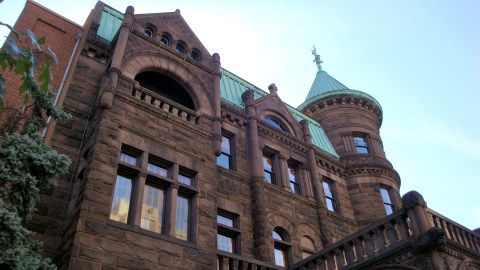This week’s guest post is an interview with future museum professional Paige LaCour, student in museum management at Northwestern University School of Continuing Studies and volunteer at the Field Museum of Natural History in Chicago.
Given that CFM has done so much work on the demographic trends shaping American society, and museums, can you tell me a bit about your demography?
On the census, I mark myself as Caucasian. I grew up in a working class family in a small southern Indiana town. My mother has held an administrative position at a non-profit organization for nearly 30 years and my father was in sales. High school was the highest level of education that both of my parents completed and I was a first generation college student. I put myself through Indiana University by working part time and taking out student loans.
Especially given the debt you’re taking on for your education, what makes you want to go into museums, which typically offer relatively low-paying positions?
It basically came down to a decision to follow my interests and passions. I double-majored in English and Anthropology because studying those topics provided me with personal fulfillment and I enjoyed the process of my education. I knew that I could choose a more lucrative career but because I was responsible in every way for my education, I wanted to do what would make me the happiest. It just so happens that what makes me happy doesn’t pay the highest!
What is it you would like to do in museums? What career path do you see for yourself?
Given my background working with children, I think I would fit in well with an educational department.I’m also interested in exhibit development and creating the narrative stories that help visitors relate to the exhibits themselves. I’m currently a docent at the Field Museum and I really enjoy interacting with the guests and providing them with information they might otherwise miss out on.
You fit right into the demographic majority of museum studies students—who are 80% white, 80% female. Museums are hearing, and saying, that they need to attract and recruit staff members who reflect the demographics of their communities. How would you feel if you found it difficult to get a job in a museum in part because you don’t fit the profile of the staff the museum is trying to build?
That is a tough issue and it hits at the heart of affirmative action in general. In a perfect world, positions would be awarded based on merit, talent and skill and everything would be equal across the board, demographically speaking.However, you raise a good point in that museums are in dire need of more diversity, especially given the rapid ethnic changes in our country. We cannot expect Latino, African American and other minority populations to increase their presence in museums if they feel alienated and are unable to identify with the curators, volunteers and staff.
Ultimately, if a position I was aiming for was given to someone else solely because I did not fit a certain profile the museum was seeking, I would feel disappointed and likely jealous. While I would understand how that decision would affect the greater good of the museum and community in general, I probably couldn’t help feeling slighted. In the end, I would work harder to differentiate myself from the other 80% of white women in the field so that I could be a front-runner for any positions that might go to someone within my own demographic.
Let’s catapult 40 years into the future. It’s your retirement party (you did get that dream job in museum education after all!) and you are reflecting on how museums have changed (or not changed) in your long career. Can you give me a capsule summary of your remarks?
“Over the last 40 years, museums have done a good job of incorporating advancing technology into their collections and exhibits. Guests have more interactive experiences and these technological advances allow them to learn in radically different ways. Instead of walking through halls and reading labels, a visitor might experience a virtual reality where they watch a dinosaur excavation, the opening of a tomb or the painting of a piece of art – even in real time. There has been an increased effort to make museums accessible to a wider demographic and the creation of exhibits and programs which allow the visitor to relate to displays on a personal level has become the norm. We’ve learned that when people feel that the museum speaks to them personally, they’re more likely to become life-long visitors.
“On the other hand, with this advancement of technology came a fundamental change in the accessibility of collections to the general public. Many museums have put a significant portion of their collections online, which is good for educating people who might not have access to the museum otherwise but has proven to be bad for getting actual foot traffic in the door. Some potential guests feel that the entire museum-going experience is actually more elitist than ever before, since they could stay at home and view the same exhibits for free.
“One of the biggest challenges faced by museums has been and continues to be a serious lack of funding. While some museums have put collections online because their actual doors have had to close, others are walking a fine line between providing enough to satiate the visitor’s general interest and giving everything away for free.”
That’s how I see things going. I think that advancing technology has the power to both help and hurt museums and it will be up to the museums themselves to determine how they utilize that technology to the best of their interests. Every museum will likely have a different plan but I believe the same general challenges will be faced by all.
If you are, like Paige, a SWF ISO a museum position, what do you think your prospects are in today’s job market? How do you feel about potentially being at a disadvantage, relative to more diverse applicants? Should museums be actively trying to build more diverse staff, even it that means favoring applicants with non-traditional backgrounds over graduates of museum studies programs? Please weigh in.









I agree with Paige that in a perfect world hiring should not be based on race or gender but instead on experience and aptitude. As a white female, I recognize the need for affirmative action. However, there are many examples where affirmative action has done more harm than good. I fear that instituting affirmative action into museums can harm an already fragile field. To prevent damage to the field, museums should stick with hiring those who are capable and trained to perform museum work, regardless of race or gender. Additionally, as the natural population of the United States begins to change, I believe that diversity in museums will also emerge naturally.
One of my museum studies professors recently told me that museum studies degrees began as a kind of affirmative action–giving women and other "outsiders" a way into the profession. Before, it had been dominated by men who got their jobs through a sort of curatorial old-boy network. Back then you had to be in the right social group to get the job–now museum studies programs offer an alternate path.
Perhaps museum studies programs can continue their role as a diversifying force–encouraging more diversity in applicants and in admissions. (Students in own program, including myself, are about 90% white and female.) If there is a gap between "diverse" and "qualified," museum studies programs can help make it disappear.
As for being second in line for a job based merely on race — would part of me be disappointed? Sure. But I'd be disappointed about not getting the job no matter why the other candidate got selected. In fact I'd rather it be for diversity than for any other reason, since the museum world is in critical need of people from diverse backgrounds.
Also of major concern is the gender imbalance. I hope the museum world isn't the next "pink ghetto," like teaching, dominated by women who work hard for little pay.
I have worked hard over the last 6 years to build up my knowledge, understanding, and skills within museums and arts nonprofits in general. I am confident that I will be able to find a job utilizing my development experience. However, I am also very aware that my white privilege has helped to get me where I am.
I think we, as museum professionals, need to acknowledge the white privilege that exists within the museum, including its board, staff, audience, and content. Then we need to reach out to our communities, which are significantly more diverse than we are, to LISTEN to what they want from us as public, educational institutions. We will only bring more diversity into our museums by acknowledging our history of excluding groups and actively seeking to change that history.
A professor of mine once told me that the one male in my graduate class would get a job far more easily than the rest of us (all women, mostly white) simply because he was memorable amongst the crowd. She was right. A year later, I have a part-time position found after months of searching, and I am one of the few women in my class who actually found paid work in my field. Our male classmate started his new full-time job days after graduation, with no experience in museum work other than the projects we did as coursework.
Me? I've been working towards this for the last ten years of my life, starting with internships in HIGH SCHOOL. Ten internships in museums and galleries! Every experience I've had, my supervisors have praised the work I've done and have given me recommendation after recommendation, reference after reference, but I still haven't managed to get a full time job.
While I am happy for my classmate that he's in a job he likes and is succeeding, I can't help but see the ease with which that happened and compare our backgrounds. I realize this reply has probably come across as resentful–well, yes. It is. I resent that all the hard work I have done still doesn't matter in some ways.
(And you're probably thinking, well, she's done something wrong if she hasn't gotten this yet, or she's just not good enough. What a waste of time. I know, because I'm constantly struggling not to be thinking that about myself. This isn't a field for the faint of heart.)
I may be white, and female, but not every white, female person is the same as the other. Even though we may have the same color equipment between our legs, that doesn't mean we all have the exact same background, skill set, or outlook. Museums, please remember that. You might be hiring one more white woman–but you are not hiring the same white woman.